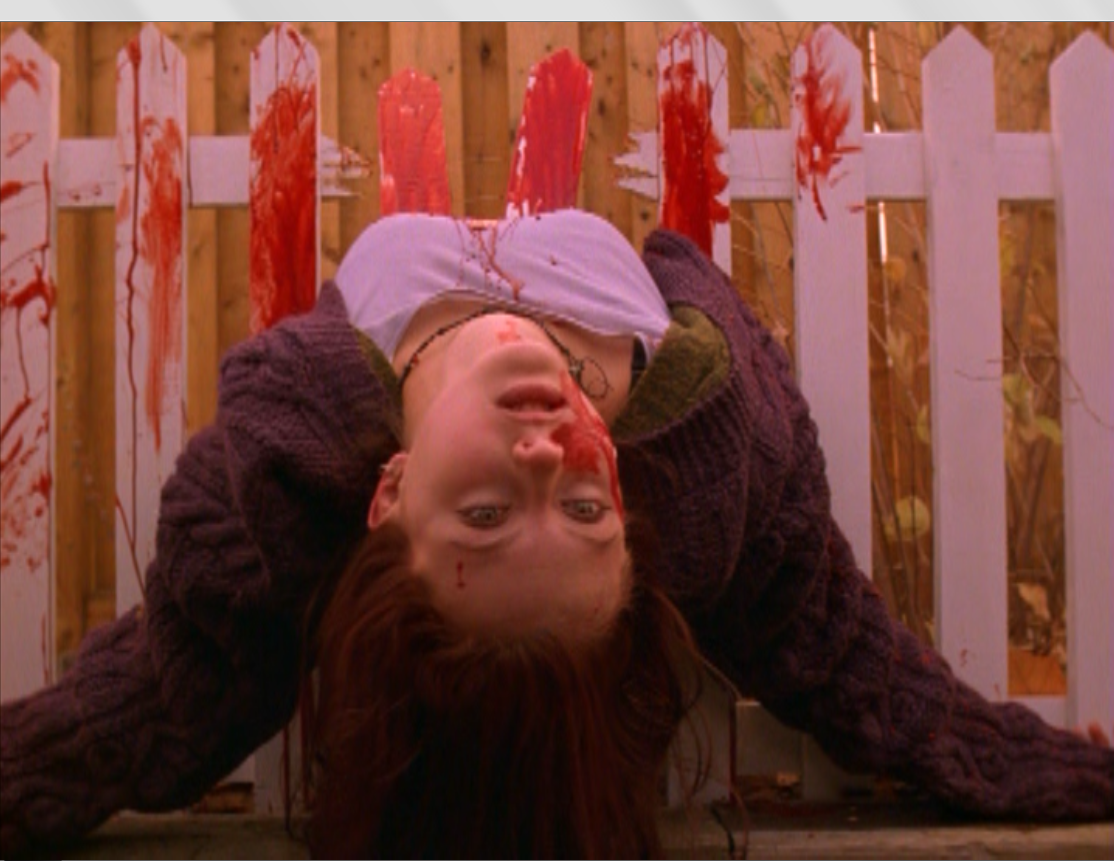Ginger Snaps (2000) almost didn’t happen. When director John Fawcett (The Dark) asked screenwriter Karen Walton (Elevated) for help writing a metamorphosis horror film about young women, she initially said no. She told Fawcett she didn’t want to work in a genre known for negative portrayals of women. We’re glad she changed her mind. Their collaboration debuted to positive word-of-mouth at the Munich Fantasy Filmfest in August 2000. The outlier werewolf flick, which earned fame as a cult favorite landmark, turns 20 this year.
THEY DON’T CALL IT THE CURSE FOR NOTHING
Women in Horror Month is the right time to celebrate a film that  broke all the male-centered rules of a werewolf movie. This was not The Howling (1981) or Wolf (1994). Women were not secondary characters contorted into the rape fantasies of aggressive were-males. Instead, they were the main characters with something of their own to say about sex and power. Walton used the genre’s trappings to craft an allegory about female sexuality and menstruation. Sisters Bridgette and Ginger suffer through their dreary suburban lives until a rabid beast bites Ginger. Her transformation into a wolf coincides with the arrival of her menses and, with it, unwanted sexual attention from men.
broke all the male-centered rules of a werewolf movie. This was not The Howling (1981) or Wolf (1994). Women were not secondary characters contorted into the rape fantasies of aggressive were-males. Instead, they were the main characters with something of their own to say about sex and power. Walton used the genre’s trappings to craft an allegory about female sexuality and menstruation. Sisters Bridgette and Ginger suffer through their dreary suburban lives until a rabid beast bites Ginger. Her transformation into a wolf coincides with the arrival of her menses and, with it, unwanted sexual attention from men.
Ginger’s response to the attention is where the scary lies in this scary movie. Katharine Isabelle (Bad Times at the El Royale) played the main character as angry and strong, driven by a thirst for vengeance exacted upon the men who render her the focal point of their desire. When an aroused boy demands sex, she rapes and bites him. She murders the school counselor for being solicitous of her sister. This is a film that refused to pander to cinematic convention. Ginger is no Jezebel. Walton did not phone it in nor create another stale wolven temptress, as in The Company of Wolves (1984) or An American Werewolf in Paris (1997). Ginger’s grisly transmogrification (Fawcett’s ode to David Cronenberg) expresses raw fury at the objectification of girls on the threshold of womanhood.
‘SUICIDE IS LIKE THE ULTIMATE FUCK YOU’

For all its rage, Ginger Snaps isn’t an angry film. Walton also made sure we had something darkly funny to chuckle at. Obsessed with death, the sisters plot a humorous and rebellious suicide pact. “Wrists are for girls,” Ginger banters. “I’m slitting my throat,” deadpans Bridgette. “You should definitely hang,” she counters. The sisters bring the same droll commitment to their hobby of filming mock suicides. They build a school project around a macabre sequence of carefully staged demises. That tableaux is also the basis of Fawcett’s memorable and creepy title sequence.
Fawcett’s direction further aided Walton in pursuing another, sadder story about family and loss. Camera angles and lighting pit the sisters against one another, now unexpected rivals for male attention. But Bridgette, played with quiet intensity by Emily Perkins (Juno), stays loyal. She fights to cure Ginger of an increasingly self-destructive and erratic rage. As the film reaches its climax, Fawcett sets that struggle against a red backlight. This warning, staged in the color of menstrual blood, signals the danger and futility of Bridgette’s quest.
Because Ginger Snaps was really a tragic love story packaged as a body horror flick, the rabid beast that bites Ginger awakens the sisters to their loss of innocence. They fight heroically, and together, against the roles society expects them to play — as sisters and rivals, human beings and monsters, saviors and martyrs. Ginger grasps this fact before her sister. “A girl can only be a slut, bitch, tease, or the virgin next door,” she warns, as the anger swallows her.
SO, THANKS KAREN WALTON
Of course, the film wasn’t perfect. Mimi Rogers’s (Bosch) off-tone acting as the clueless suburban mother deprived the film of striking a comedic balance to complement the film’s darker elements. Perhaps it was better that Ginger Snaps didn’t succeed in reaching for these easy laughs. A film that undoes a generation’s worth of clichés about women and werewolves should be serious. Had the film been filled with the formulaic laughs of mainstream horror, then maybe we wouldn’t still be talking about it.

So, we should thank Karen Walton for saying yes to Fawcett. Her change of heart two decades ago helped to clear a path for female protagonists in horror, whether in standard Hollywood fare such as Underworld (2003) or the indie efforts of the Soska sisters. I can see the film’s influence on Chelsea Cain’s recent award-winning comic, Man-Eaters. And the film gave Walton and Fawcett the chance to collaborate on a second fan favorite. Check out the first two seasons of another dark, funny story about the trials and joys of sisterhood in Orphan Black (2013-14).

